
Although it may sound like it belongs in a fairytale or story book rather than on your plate, dragon fruit is a versatile, vibrant and nutritious ingredient that’s brimming with health benefits.
Also called dragon pearl fruit, cactus fruits, pitahaya or pitaya, dragon fruit is a tropical and delicious superfood that can do a lot for your health. In fact, a few of the potential health benefits of dragon fruit include slowed signs of aging, enhanced immune function and improved blood sugar levels, all of which are important for supporting overall health.
In recent years, this flavorful ingredient has continued gaining popularity among adventurous eaters and fruit-lovers alike. In fact, it has even inspired a Starbucks drink that pairs the fruit with green coffee bean extract, mango and white grape juice.
So while dragons may not be real, the namesake fruit most certainly is. Let’s take a look at a few ways that pitaya can benefit the body.
What Is Dragon Fruit?
Originating in tropical regions throughout the Americas, pitaya is actually part of the cactus family, which makes sense given its spiky outer layer. It comes from a dragon fruit plant that looks like a climbing vine and grows best in dry areas.
This fruit can be rather intimidating upon first glance, but it peels quite easily. It’s usually oval, elliptical or pear-shaped and has a sweet, sometimes sour taste. The inside is typically white or red with little seeds that look a lot like sesame seeds and offer a similar crunch as the seeds found in a kiwi.
Today, distribution mainly comes from areas like South Florida, the Caribbean, Hawaii, Taiwan and Malaysia. It’s known as Pitahaya in Mexico and as Pitaya roja in South and Central America. Pitahaya is the Spanish name for fruiting vines of Central America.
Keep in mind that dragon fruit is much different than dragon eye fruit, also known as longan, which is a tropical fruit closely related to other species, such as the lychee, rambutan and ackee.
There are several different varieties of pitaya available, each of which differs slightly in terms of taste and appearance. Here are a few of the most common kinds:
- Pitaya amarilla (Hylocereus megalanthus): This type of yellow dragon fruit has white flesh and distinct black seeds.
- Pitaya blanca (Hylocereus undatus): Also known as white dragon fruit, this variety has vibrant pink skin, white flesh and black seeds inside.
- Pitaya roja (Hylocereus costaricensis): This red dragon fruit has bright reddish-pink skin with red flesh and black seeds.
Nutrition
Take a look at the dragon fruit nutrition facts and it’s easy to tell why this tropical fruit is so stellar for your health. Not only is it low in calories, but it’s also a great source of dietary fiber, magnesium and riboflavin.
Other components of the fruit also boast other nutrients. The seeds, for instance, are high in healthy fats while the skin is a great source of fiber.
100 grams of pitaya contains the following nutrients:
- 60 calories
- 13 grams carbohydrates
- 1.2 grams protein
- 3 grams dietary fiber
- 40 milligrams magnesium (10 percent DV)
- 0.1 milligrams riboflavin (8 percent DV)
- 0.7 milligrams iron (4 percent DV)
- 2.5 milligrams vitamin C (3 percent DV)
- 0.4 milligrams niacin (2 percent DV)
- 18 milligrams calcium (1 percent DV)
It also contains phosphorus and other vitamins and minerals.
Benefits
1. Potential Immune Booster
Dragon fruit is jam-packed with flavonoids and flu-fighting vitamin C, which is great for the immune system. In fact, it contains more vitamin C than a carrot, making pitaya one of the better vitamin C foods around.
Dragon fruit also ranks high on the antioxidant list, which helps kick harmful free radicals to the curb. Even more support steps up from vitamins B1, B2 and B3, as well as calcium, phosphorous, iron, protein, niacin and fiber, all of which team up to keep your immune system in tip-top shape.
2. Digestion Helper
We know that fiber aids in digestion, and the best way to get fiber is through fruits and vegetables. Pitaya contains a good bit of fiber, which can help keep you regular and eliminate issues like constipation and acid reflux.
Fresh dragon fruit contains about one gram of fiber per 100 grams whereas dried dragonfruit packs in about 10 grams per 100 grams, making it a great high-fiber food. To get a bit more fiber, you can even eat the skin and seeds of the pitaya.
Another reason dragon fruit benefits digestion is due to the oligosaccharides it contains. These oligosaccharides work as prebiotics, which in turn improve gut health and digestion.
READ RELATED: Doctors make breakthrough to help spot ovarian cancer before it's too late
According to research published in the journal 3 Biotech, “the introduction of functional compounds like prebiotics in the diet seems to be an attractive alternative to ameliorate the quality of life ridden with obesity, cancer, hypersensitivity, vascular diseases and degenerative ailments.”
3. Diabetes Management and Prevention
Besides promoting better digestion, the fiber found in pitaya can also help stabilize blood sugar levels to maintain better blood sugar control.
An animal model published in the Journal of Pharmacognosy Research noted that pitaya helped reduce oxidative stress, suggesting that its consumption could help prevent some issues associated with diabetes. Not only that, but further research examining how dragon fruit benefits insulin resistance in obese mice found that eating dragon fruit could reduce the risk of developing diabetes as well.
4. Heart-Healthy
The animal model mentioned above in the Journal of Pharmacognosy Research showed that dragon fruit may help decrease levels of bad LDL cholesterol while improving good HDL cholesterol, making dragon fruit an excellent cholesterol-lowering food.
And let’s not forget those little black seeds inside the dragon fruit. Each serving delivers a mega-dose of omega fatty acids, which can help reduce triglycerides to protect heart health.
5. Keeps You Looking Youthful
Antioxidants are not only awesome at keeping the inside of the body in good order, but they also pack a powerful punch when it comes to skin health as well. Antioxidants do a great job of keeping the skin tight and firm, which can help preserve a youthful appearance.
Additionally, the phosphorus in the fruit provides a boost in the anti-aging department. Phosphorus, an important mineral found in every cell of the body, makes up about 1 percent of your total bodyweight. Because it’s found in every cell, its effect on the repair of those cells is important to the youthfulness of our skin and prevention of premature aging.
6. Potential Cancer Prevention
Dragon fruit contains a host of antioxidants, including phytoalbumin, vitamin C and lycopene. These antioxidants can help neutralize harmful free radicals and may even offer protection against cancer
Lycopene, in particular, has been shown to be particularly effective against cancer cells. In fact, some research shows that a higher intake of lycopene-rich foods could be linked to a lower risk of developing prostate cancer.
What’s more, an in-vitro study published in Nutrition and Cancer also showed that treating ovarian cancer cells with lycopene blocked the growth and spread of cancer cells and reduced cell viability.

How to Eat
Figuring out where to buy this tasty fruit can be a bit challenging and may require you to search beyond your local supermarket. However, it is often available at many farmers markets, health food shops and specialty stores.
There are a few methods for how to tell if dragon fruit is ripe, but the easiest way is to look for a fruit with an even color and no soft spots or signs of spoilage. When squeezed, it should give slightly, which indicates that it’s fully ripe and ready to enjoy.
Wondering how to eat dragon fruit, and what does dragon fruit taste like? With its sweet, slightly sour flavor, pitaya makes an awesome addition to salads, smoothie bowls and shakes. It can also be paired with other fruits and used as topping for yogurt and oatmeal and even works well in salsa recipes, baked goods and sherbets.
The quickest method for how to cut dragon fruit involves simply slicing it down the middle and separating into two halves. The fruit can be enjoyed as is with a spoon, or you can peel the skin back and slice it into chunks or cubes for use in your favorite recipe.
Risks and Side Effects
For most people, this flavorful fruit can be enjoyed safely as part of a healthy, well-rounded diet.
In rare cases, however, some people have reported experiencing an allergic reaction after consuming the fruit. If you experience any dragon fruit side effects like hives, itching and swelling, discontinue use immediately, and talk to your doctor.
Because it’s also relatively high in fiber, increasing your intake suddenly could cause issues like bloating, constipation and stomach pain. Be sure to increase fiber intake slowly, and pair with plenty of water to prevent negative side effects.
Final Thoughts
- Dragon fruits are a type of tropical fruits that are notable for their unique appearance and impressive nutrient profile.
- The dragon fruit origin is thought to be in tropical regions in the Americas, but it is now widely cultivated in other areas, including Southeast Asia, Florida and the Caribbean.
- The climbing vine on which the fruit grows on looks similar to a dragon fruit tree but is actually a type of dragon fruit cactus that grows best in dry areas.
- Potential benefits of dragon fruit include improved heart health, enhanced digestion, increased immunity, better blood sugar control and protection against certain types of cancer.
- There are many options for how to prepare dragon fruit, and it makes a great addition to salads, smoothie bowls and shakes, along with many other recipes. Other ideas for how to eat dragon fruit include adding it to baked goods, yogurt, oatmeal or even salsa.
Source:









